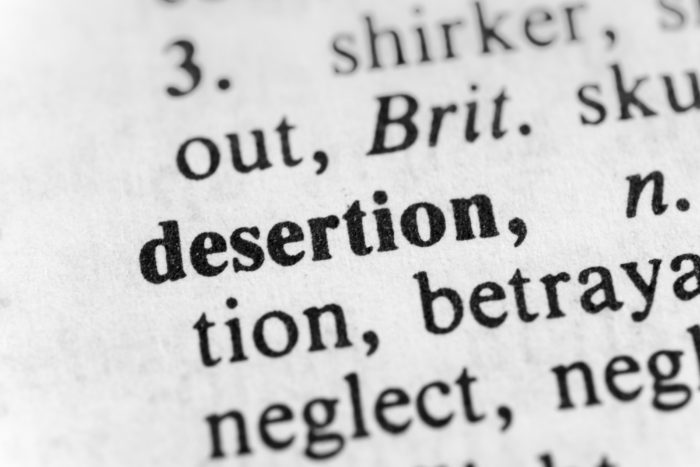How to Know if You Were Emotionally Abandoned as a Child: 4 Signs

Abandonment issues lurk under the surface of your life, often raising their ugly heads when you least expect them. Abandonment issues are caused by a painful experience of being left by someone important, like a parent, spouse, sibling or very close friend.
Any single one of these three key factors can make you more vulnerable to developing abandonment issues:
- The abandonment is sudden or unexpected
- Your abandonment experience happens in your childhood
- You have a general tendency to downplay or ignore your own feelings
All abandonment is not the same. There are two different types.
What is Physical Abandonment?
Most people think of abandonment as a physical experience. In other words, when a child is abandoned, it means that his parents physically left him. Many children have this painful event happen when a parent dies or leaves them for another reason. Adults can be physically abandoned by their spouse leaving them, or by another important person in their lives dying or moving away.
What is Emotional Abandonment?
Emotional abandonment is far less obvious, yet equally painful. Emotional abandonment happens when an important person who you believe cares about you and loves you, seems to stop caring about and loving you.
Abandonment Issues Are A Coping Response
The experience of being abandoned, either physically or emotionally, prompts a very predictable response in your human brain. Your brain automatically goes into high alert, becoming hyper-vigilant for any whiff of anything that could lead you to be hurt by another abandonment.
If you do not acknowledge and work through how you feel about the abandonment experience, your brain’s hypervigilance becomes more intense and continues longer. Over a much longer time than necessary, you may search for rejections or potential abandonments everywhere, and your brain may continually hold you back from taking healthy emotional risks in your life. This is the very definition of “abandonment issues.”
4 Signs You Have Abandonment Issues
- A fear of initiating plans with people – This likely applies not only to new friends and acquaintances. You may have the same fear about suggesting plans with those you’re close to.
- A feeling of hurt and/or anger when someone fails you, even in a small, explainable way – You may experience everyday failures of the everyday people in your life especially acutely. It’s hard for you to take in the other person’s circumstances as an explanation. Instead, you feel it personally and deeply.
- You feel safer keeping people at a distance – Depending on others emotionally is scary, so you prefer to keep your relationships feeling safe. You may be great at taking care of others emotionally, but you’re afraid to let others take care of you.
- You tend to downplay the importance of the people in your life – You may find yourself at times pretending that you care less than you do about certain people and what they do. “I don’t care if you’re there or not,” “Either way, it’s good with me,” “You can do whatever you want and it won’t matter to me,” are things you may hear yourself saying.
The Role of Childhood Emotional Neglect (CEN) in Abandonment Issues
Childhood Emotional Neglect happens when your parents fail to respond enough to your emotions as they raise you. When you grow up this way, you receive a powerful, unspoken message throughout your childhood that your emotions do not matter.
Being raised to ignore your feelings sets you up to downplay your emotional reactions to all of the things that happen throughout your entire life, and that includes your abandonment experience.
Unfortunately, ignoring and downplaying your feelings about the abandonment prevents you from being able to work through them in a healthy way. All that old hurt, sadness, anger and fear stays right there with you, keeping your brain in high alert, and holding you back from new relationships and experiences. All of this may happen completely outside of your awareness.
What To Do if You See These Signs in Yourself
- Become aware of your abandonment fear – Accepting your sensitivity to abandonment, and the event that originally caused it, is an important key. Once you see your fear and what caused it, you can begin to take control of it.
- Become aware of the Emotional Neglect in Your Childhood – Just as Childhood Emotional Neglect (CEN) sets you up to be vulnerable to abandonment issues, healing your Childhood Emotional Neglect will help you resolve them. Learning to pay attention to your own feelings, and how to value and use them (all part of recovery from CEN) will not only go far toward solving your abandonment issues but will make you stronger in many other areas of your life too.
Childhood Emotional Neglect (CEN) is often subtle and invisible, so it can be hard to know if you have it. To learn more about CEN and how to heal it, Take The Emotional Neglect Test. It’s free.
To learn how Childhood Emotional Neglect happens and how to heal yourself see the book Running On Empty: Overcome Your Childhood Emotional Neglect. To learn how to heal CEN in your relationships and as a parent, see the book Running On Empty No More: Transform Your Relationships.
